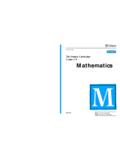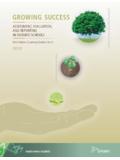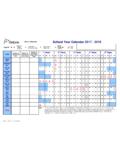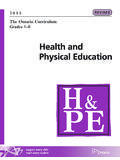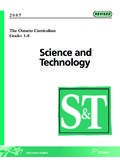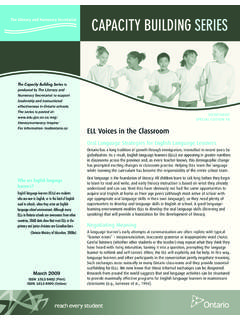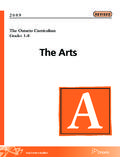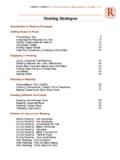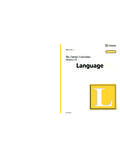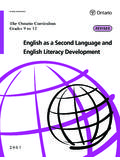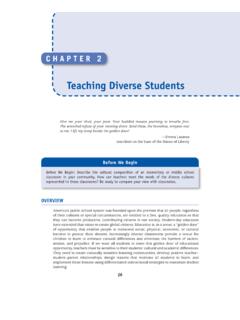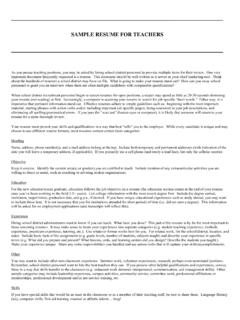Transcription of The Ontario Curriculum, Grades 11 and 12: English, 2007 ...
1 English2007 Ministry of EducationThe Ontario CurriculumGrades 11 and 12 REVISEDP rinted on recycled paper07-003 ISBN 978-1-4249-4741-6 (Print)ISBN 978-1-4249-4742-3 (PDF)ISBN 978-1-4249-4743-0 (TXT) Queen s Printer for Ontario , 2007 English-E11-12 7/27/07 2:24 PM Page 1 INTRODUCTION3 Secondary Schools for the Twenty-first Century ..3 The Importance of Literacy, Language, and the English curriculum ..3 Principles Underlying the English curriculum ..4 Roles and Responsibilities in English Programs ..5 THE PROGRAM IN ENGLISH9 Overview of the Program.
2 9 curriculum Expectations ..12 Strands in the English curriculum ..14 ASSESSMENT AND EVALUATION OF STUDENT ACHIEVEMENT20 Basic Considerations ..20 The Achievement Chart for English ..22 Evaluation and Reporting of Student Achievement ..26 Reporting on Demonstrated Learning Skills ..26 SOME CONSIDERATIONS FOR PROGRAM PLANNING27 Ministry Resources ..27 Instructional Approaches ..27 Planning English Programs for students With Special Education Needs ..28 Program Considerations for English Language Learners ..30 Antidiscrimination Education.
3 33 Literacy, Mathematical Literacy, and Inquiry/Research Skills ..34 The Role of the School Library in the English Program ..34 The Role of Technology in the English Program ..35 The Ontario Skills Passport and Essential Skills ..36 Career Education ..36 Cooperative Education and Other Forms of Experiential Learning ..36 Planning Program Pathways and Programs Leading to a Specialist High-Skills Major .. 37 Health and Safety in the English Program .. 37 CONTENTSThis publication is available on the Ministry of Education swebsite, at COURSES39 English, Grade 11, University Preparation (ENG3U).
4 41 English, Grade 11, College Preparation (ENG3C).. 59 English, Grade 11, Workplace Preparation (ENG3E).. 75 English, Grade 12, University Preparation (ENG4U).. 91 English, Grade 12, College Preparation (ENG4C).. 109 English, Grade 12, Workplace Preparation (ENG4E).. 127 OPTIONAL COURSES143 Canadian Literature, Grade 11, University/College Preparation (ETC3M) .. 145 Media Studies, Grade 11, Open (EMS3O) .. 151 Presentation and Speaking Skills, Grade 11, Open (EPS3O).. 163 Studies in Literature, Grade 12, University Preparation (ETS4U).
5 169 The writer s Craft, Grade 12, University Preparation (EWC4U) .. 175 Studies in Literature, Grade 12, College Preparation (ETS4C) .. 183 The writer s Craft, Grade 12, College Preparation (EWC4C) .. 189 Business and Technological Communication, Grade 12, Open (EBT4O) .. 197 GLOSSARY205 This document replaces The Ontario curriculum , Grades 11 and 12: English, 2000. Beginningin September 2007, all English courses for Grades 11 and 12 will be based on the expectationsoutlined in this SCHOOLS FOR THE TWENTY-FIRST CENTURYThe goal of Ontario secondary schools is to support high-quality learning while givingindividual students the opportunity to choose programs that suit their skills and updated Ontario curriculum , in combination with a broader range of learning optionsoutside traditional classroom instruction.
6 Will enable students to better customize theirhigh school education and improve their prospects for success in school and in IMPORTANCE OF LITERACY, LANGUAGE, AND THE ENGLISH CURRICULUML iteracy is about more than reading or writing it is about how we communicate in society. It is about social practices and relationships, about knowledge, language and who use literacy take it for granted but those who cannot use it are excludedfrom much communication in today s world. Indeed, it is the excluded who can bestappreciate the notion of literacy as freedom.
7 UNESCO, Statement for the United Nations Literacy Decade, 2003 2012 Literacy development is a communal project, and the teaching of literacy skills is embeddedacross the Ontario curriculum . However, it is the English curriculum that is dedicated todeveloping the knowledge and skills on which literacy is based that is, knowledge andskills in the areas of listening and speaking, reading, writing, and viewing and development is central to students intellectual, social, cultural, and emotionalgrowth and must be seen as a key component of the curriculum .
8 When students learn touse language, they do more than master the basic skills. They learn to value the power of language and to use it responsibly. They learn to express feelings and opinions and tosupport their opinions with sound arguments and evidence from research. They becomeaware of the many purposes for which language is used and the diverse forms it can taketo serve particular purposes and audiences. They learn to use the formal language appro-priate for debates and essays, the narrative language of stories and novels, the figurativelanguage of poetry, the technical language of instructions and manuals.
9 They develop an awareness of how language is used in different formal and informal situations. Theycome to understand that language is an important medium for communicating ideas andINTRODUCTION information, expressing world views, and realizing and communicating artistic learn that language can be not only used as a tool but also appreciated and is the basis for thinking, communicating, learning, and viewing the need language skills in order to comprehend ideas and information, to interactsocially, to inquire into areas of interest and study, and to express themselves clearly anddemonstrate their learning.
10 Learning to communicate with clarity and precision will helpstudents to thrive in the world beyond is a fundamental element of identity and culture. As students read and reflecton a rich variety of literary, informational, and media texts,1they develop a deeper under-standing of themselves and others and of the world around them. If they see themselvesand others in the texts they study, they will be more engaged in learning and they willalso come to appreciate the nature and value of a diverse, multicultural society. They willdevelop the ability to understand and critically interpret a range of texts and to recognizethat a text conveys one particular perspective among skills are developed across the curriculum and, cumulatively, through the use and develop important language skills as they read and think about topics,themes, and issues in various subject areas.
